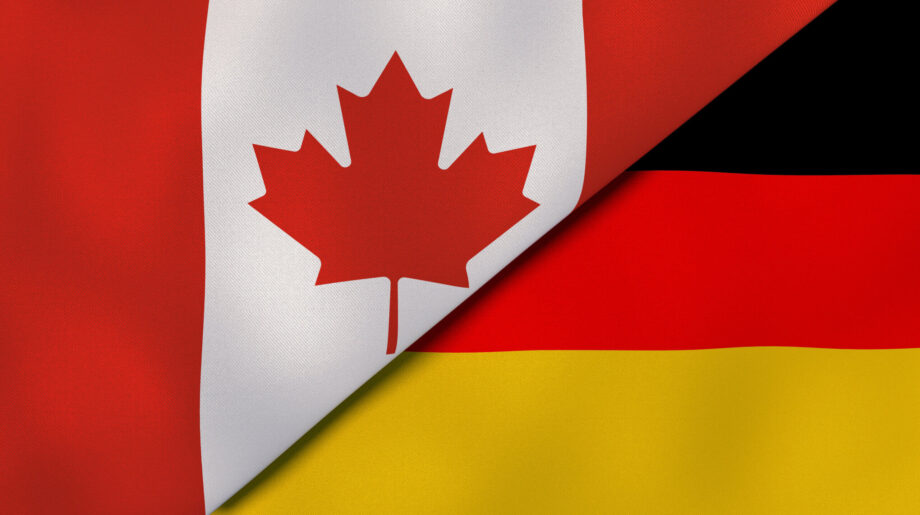Work in Canada Germany

Work in Canada Germany
Situated in Central Europe, Germany is the most populated member state of the European Union (EU). It borders Austria, Belgium, Denmark, Poland, the Czech Republic, Luxembourg, Switzerland, France, and the Netherlands. The country also has access to the North Sea and the Baltic Sea. The Alps stretch across the south of Germany. Its total area is 357,022 km2, and its total population is 83,695,430 citizens. The capital and most populous city of Germany is Berlin, but its financial center is Frankfurt.
German is the official language in the country. It is also one of the 24 official languages of the EU, and one of the three procedural languages of the European Commission, along with English and French. With about 100 million native speakers, German is the most spoken first language in the EU.
Germany is a great power with a highly advanced economy and high standards of living. It is a leading member of the EU and an important player in international affairs. The country is also a member of NATO, the G7, the G20, the United Nations, and the OECD.
Despite the economic prosperity, nearly 400,000 citizens of Germany choose to live and work in Canada temporarily. In addition, over 3,322,405 Canadians have full or partial German ancestry. They prefer to settle in Ontario, Alberta, British Columbia, Saskatchewan, and Manitoba. Hence, keep reading to discover the most popular pathways to work in Canada for residents of Germany.
IEC Programs
Among the most popular programs for German youth who want to work in Canada is the International Experience Canada (IEC). It has three streams, but citizens of Germany can participate in the IEC twice and need to choose a different category each time.
The first option is the Working Holiday stream, under which foreigners can live and work in Canada for up to one year. The second option is the Young Professionals stream, which allows post-secondary German graduates to work in Canada and gain professional work experience for up to a year. The third option is the International Co-op stream, under which residents of Germany who study at post-secondary educational institutions in their home country can complete an internship in Canada for up to one year.
Foreigners who want to apply to the IEC and work in Canada must meet the following requirements.
- They need to be residents of Germany and prove their citizenship by submitting their mailing or residential address in Germany.
- Applicants should have a valid German passport since the permit to work in Canada cannot be valid longer than the passport.
- Foreigners ought to be 18 to 35 years old inclusively.
- Citizens of Germany need to have about 2,500 CAD of personal funds to cover their expenses in Canada.
- They must have health insurance for the duration of their trip to Canada.
- Applicants should be admissible to the country.
- Foreigners ought to have a round-trip ticket or buy a departure ticket at the end of their authorized stay in Canada.
- Residents of Germany cannot travel to the country with their dependents.
- Applicants need to pay the application fee of 161 CAD. Foreigners who are going to work in Canada under the Working Holiday also ought to pay the open work permit fee of 100 CAD.
- Participants of the Young Professionals stream must obtain a signed contract of employment in Canada. It should be in the applicant’s field of expertise and contribute to their work experience.
- Citizens of Germany who apply to the International Co-op stream ought to be registered students for the duration of the program and obtain a signed contract for a work placement or an internship in Canada.

Job Offer with LMIA
The next option to work in Canada is the Temporary Foreign Worker Program (TFWP). To qualify for it, residents of Germany must have a job offer, which includes the details of their future employment, working conditions, and salary. Moreover, prospective employers who want to hire foreigners under the TFWP must have the Labour Market Impact Assessment (LMIA). The document proves that there is a labor shortage, and local specialists do not qualify for the position.
Once Employment and Social Development Canada (ESDC) issues the LMIA, the employers ought to send its copy to the potential workers from Germany. Then, foreigners can apply for a work permit. To work in Canada, applicants need to meet the following requirements.
- They must prove they will leave Canada when their work permit expires.
- Citizens of Germany should demonstrate they have personal funds to take care of themselves and their family members during their stay in the country.
- Applicants ought to obey the law and have a police clearance certificate from their country of residence.
- They should have a medical exam.
- Residents of Germany do not have a right to work for ineligible employers.
- Foreigners need to pay the work permit application fee of 155 CAD.
An officer in charge can also ask to provide additional documents to verify the information and issue a permit to work in Canada. The application processing time for citizens of Germany is eight weeks.
Expats
Germany has the third highest population of expats who work in Canada, after France and the UK. Foreign workers have various job opportunities since the country faces a labor shortage. The business sectors with a lack of skilled workers are the construction, agriculture, information technology, and health sectors. Thus, the list of high-demand occupations ranges from nurses and surgeons to engineers and scientists.
By the way, expats from Germany who work in Canada tend to have competitive salaries and employee bonuses. The highest-paid business sectors are oil and gas drilling because the country is one of the few developed nations that are net exporters of energy. Citizens of Germany who are going to live and work in Canada can consider job offers through the Job Bank.
Post-Graduation Work Permit
Canada draws about 20,000 students from Germany every year. Among the reasons to choose Canada as the study destination is the possibility of working in Canada under a post-graduation work permit (PGWP) for up to three years. However, the validity period of the permit depends on the length of the study program.
To work in Canada under the PGWP, international students need to complete at least a two-year full-time study program at a Designated Learning Institution (DLI). At the time of application to the PGWP, they must provide an official transcript and a letter from their DLI confirming the completion of the study program.
Spouse Open Work Permit
One more option to work in Canada is to get an open work permit. This type of work permit allows citizens of Germany to work for any employer in Canada. Still, only certain categories of foreigners can qualify for open work permits. Among them are spouses of Canadians, temporary foreign workers, and international students.
Spouses of permanent residents and citizens of Canada can work in the country if they meet the eligibility requirements of the Inland Sponsorship program. To work in Canada, they ought to submit an open work permit application along with the sponsorship application package.
Residents of Germany may also qualify for an open work permit if their spouses are temporary workers who work in Canada under TEER 0, 1, or 2 for at least six months.
Spouses of full-time international students who have a valid study permit and study at a DLI can be eligible to apply for an open work permit. Citizens of Germany may also work in Canada under open work permits when their spouses work in the country under the PGWP. Then, the duration of the spouse's open work permit corresponds with the validity period of the PGWP.
In case, if you need help with Work in Canada from Germany or other immigration programs, please fill in application below or contact us directly.

